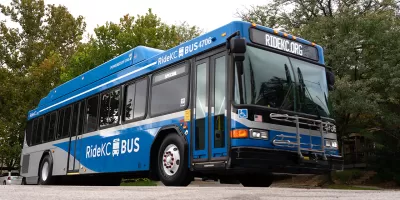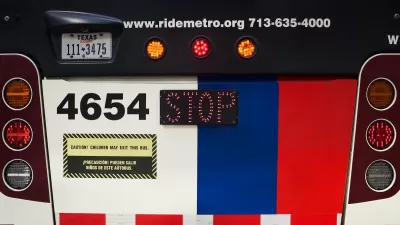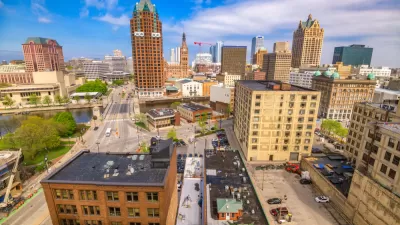A new on-demand transit service is meant to fill gaps in Kansas City regional bus service, but some transit supporters worry the service is drawing funding away from fixed-route buses.

A push to promote an on-demand transit service in Kansas City is drawing concern from transit advocates who worry that an overreliance on on-demand services will lead to a loss of reliable, fixed-route bus service, reports Noah Zahn for KCUR.
Known as IRIS, the new Kansas City service is meant to fill gaps in existing bus routes. It is the first program of its kind to cover an entire city of this size in the United States, according to Tyler Means, chief mobility officer for the Kansas City Area Transportation Authority (KCATA).
“However, there are some concerns that IRIS could result in less access to public transportation, not more. KCATA announced recently that it’s ending the Gladstone-Antioch Flex route, and all other bus stops in Gladstone will be discontinued beginning September 1.” The city of Gladstone says KCATA almost quadrupled the price of its contract, forcing it to end transit services. “Instead, Gladstone opted for a three-month trial of IRIS at $7,000 per month.”
IRIS only runs from 6am to 6pm, a dramatically shorter schedule than RideKC buses. On the other hand, “Means says the average wait time for an IRIS ride was under six minutes, while current bus lines only make stops in Gladstone every 30-60 minutes.”
FULL STORY: Kansas City sees IRIS as the 'future' of public transit. But is it coming at the expense of buses?

Planetizen Federal Action Tracker
A weekly monitor of how Trump’s orders and actions are impacting planners and planning in America.

Congressman Proposes Bill to Rename DC Metro “Trump Train”
The Make Autorail Great Again Act would withhold federal funding to the system until the Washington Metropolitan Area Transit Authority (WMATA), rebrands as the Washington Metropolitan Authority for Greater Access (WMAGA).

The Simple Legislative Tool Transforming Vacant Downtowns
In California, Michigan and Georgia, an easy win is bringing dollars — and delight — back to city centers.

The Small South Asian Republic Going all in on EVs
Thanks to one simple policy change less than five years ago, 65% of new cars in this Himalayan country are now electric.

DC Backpedals on Bike Lane Protection, Swaps Barriers for Paint
Citing aesthetic concerns, the city is removing the concrete barriers and flexposts that once separated Arizona Avenue cyclists from motor vehicles.

In These Cities, Most New Housing is Under 441 Square Feet
With loosened restrictions on “micro-housing,” tiny units now make up as much as 66% of newly constructed housing.
Urban Design for Planners 1: Software Tools
This six-course series explores essential urban design concepts using open source software and equips planners with the tools they need to participate fully in the urban design process.
Planning for Universal Design
Learn the tools for implementing Universal Design in planning regulations.
Smith Gee Studio
City of Charlotte
City of Camden Redevelopment Agency
City of Astoria
Transportation Research & Education Center (TREC) at Portland State University
US High Speed Rail Association
City of Camden Redevelopment Agency
Municipality of Princeton (NJ)





























